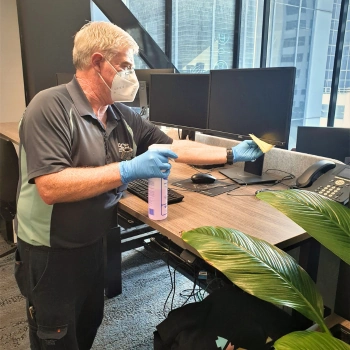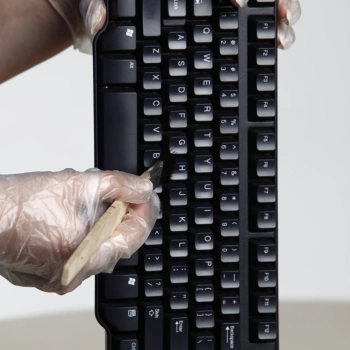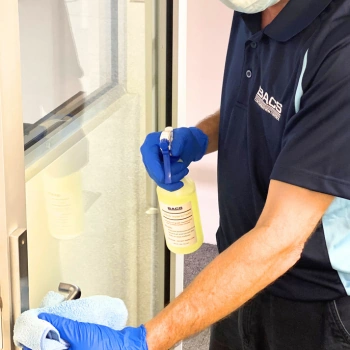Site Information
Reap the Benefits of Regular Workplace Cleaning and Disinfection
WHY YOU NEED TO DO IT?
 Fig 1: Desktop cleaning in a workplace.
Fig 1: Desktop cleaning in a workplace.
The Federal Work Health & Safety Act 2011 obligates all employers to ensure the wellbeing of workers as well as visitors
Most sites have shared facilities where many people come in close proximity and many surfaces are frequently touched. In these conditions, bacteria and viruses can easily spread and contaminants can quickly accumulate, causing health risks and compromising equipment function.
Regular cleaning and disinfection not only create a more professional working environment which people are more likely to maintain, illness and staff downtime are reduced. Removing accumulated dust and residue also acts as preventative maintenance to keep equipment performing reliably.
WHY YOU SHOULD BE CONCERNED?
 Fig 2: Keyboard cleaning in a workplace.
Fig 2: Keyboard cleaning in a workplace.
Bacteria and viruses from COVID to the common cold, influenza and gastro (E. coli) are brought into the workplace by people. Once there, they can quickly spread. Dust particles also have a detrimental effect on human health with the potential to cause respiratory problems and irritate the eyes, throat and skin.
Contaminants can also enter equipment, block filters and cause overheating. Abrasive dust can cause mechanical malfunctions, especially with keyboards, buttons and switches. Depending on the source, dust particles can also be corrosive and conductive, damaging motherboards and short-circuiting power supplies.
Residue attracts and holds particles and germs on a surface. This enables them to be contact-transferred from one area to another, causing contamination to become widespread.
HOW TO MINIMISE YOUR RISK?
Because every workplace has different cleanliness and hygiene requirements, all risks should be carefully evaluated and efforts should be made to mitigate them.
 Fig 3: Disinfecting touch-points in a workplace.
Fig 3: Disinfecting touch-points in a workplace.
- Conduct a thorough risk and hazard assessment.
- Establish, document and display workplace hygiene policies
and practices, making sure all employees and visitors
follow them.
- Have a regular cleaning schedule in place and create a
checklist to outline exactly what gets done each time.
- Provide handwashing facilities and hand sanitisers which
contain at least 70% alcohol.
- Check ventilation systems and perform any needed repairs
and maintenance such as filter changes.
- Increase fresh air intake and open windows where possible
and safe to do so.
- Set up air disinfection purifiers which combine HEPA
and activated carbon filtration with contact disinfection
and ultraviolet germicidal irradiation.
- Provide and require the usage of personal protective
equipment (PPE) such as face masks, gloves, goggles and
respirators, as dictated by work situation, the ability to
socially distance, and any regulations in place at the time.
- Store dust-producing materials (cardboard, paper, toner,
etc.) in plastic containers in storage rooms or closets,
rather than in work areas.
- Engage a professional technical cleaning company to
develop a site-specific scope of work for cleaning and
touchpoint disinfection, especially when critical equipment
and controlled environments such as data centres,
cleanrooms, laboratories, hospitals, etc. are involved.
PRODUCTS TO COMPLIMENT YOUR WORKSPACE